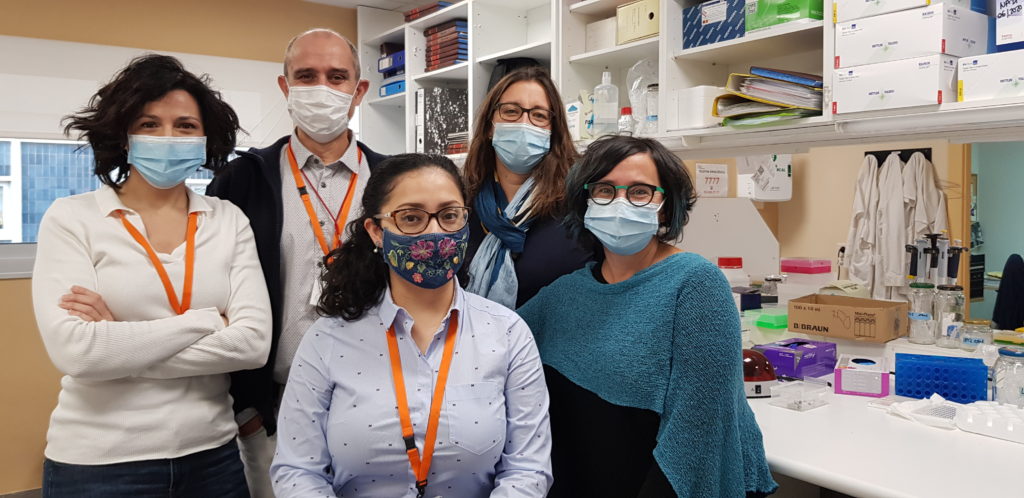Approximately 10% of patients who suffer cancer carry a germline genetic variant in all their cells that promotes early development of tumors. It is important to identify these patients in order to offer a personalized assessment of the risk of cancer. At the same time, it allows to monitor them and provide better prevention measures and eventual treatments. In addition, the identification of a pathogenic variant allows predictive studies on patients’ relatives.
Diagnosis is currently performed by analyzing genetic panels with mass sequencing techniques. This approach has increased the detection rate of pathogenic variants, as well as the number of variants of unknown significance. A correct clinical interpretation of genomic data requires detailed knowledge of the structural and functional characteristics of each gene. It is also crucial to associate the clinical symptoms with the presence of genetic defects.
It has been described that pathogenic variants in the ATM gene increase the risk of cancer, particularly breast cancer. For this reason, this gene is included in most hereditary cancer panels. ATM is a long gene, with a high number of variants identified. The significance of many of these variants is unknown, which represents a major clinical problem.
In order to standardize and improve the classification of ATM variants in the context of hereditary cancer, a collaborative effort was initiated by Bellvitge’s Institute for Biomedical Research (IDIBELL) and the Catalan Institute of Oncology (ICO).
Six independent laboratories collected information from 766 individuals carrying 283 different ATM variants. After collecting and organizing the variants information, periodic teleconferences were held to review the international classification criteria, adjusting them specifically for the ATM gene. Once agreed, these criteria were used in a pilot test of 50 representative variants. The new classification reduced the number of variants with unknown significance from 58% to 42%.
The results, published in the Clinical Chemistry journal, highlight the importance of sharing information among laboratories. Optimizing the classification criteria of genetic variants within a multidisciplinary environment provides a positive impact on the medical assistance of the patients and their families.
A team work
In this study, genetic data have been obtained from 6 Spanish laboratories:
- The Molecular Diagnostics Laboratory ICO-IDIBELL, Hospitalet de Llobregat, Barcelona
- The Hereditary Cancer group (VHIO)-The Molecular Genetics Laboratory-Vall d’Hebron Hospital, Barcelona
- The Galician Public Foundation of Genomic Medicine (FPGMX), The Galician Service of Health (SERGAS) and the Institute of Research in Health of Santiago de Compostela (IDIS)
- The Molecular Oncology Laboratory, San Carlos Clinical Hospital, Madrid
- The Human Genetics Laboratory, CNIO, Madrid
- The Hereditary Cancer Laboratory, 12 de Octubre Hospital, Madrid
In addition, predictive bioinformaticians (Xavier de la Cruz’s group, VHIR) and ATM gene experts in the areas of genetics, health and molecular biology (Ignacio Molina, University of Granada) have joined the study.
This study has been also supported by several research projects of the Carlos III Health Institute, including researchers from the Centre for Biomedical Research in Cancer (CIBERONC) and the Centre for Biomedical Research in Rare Diseases (CIBERER).
The Bellvitge Biomedical Research Institute (IDIBELL) is a biomedical research center created in 2004. It is participated by the Bellvitge University Hospital and the Viladecans Hospital of the Catalan Institute of Health, the Catalan Institute of Oncology, the University of Barcelona and the City Council of L’Hospitalet de Llobregat.
IDIBELL is a member of the Campus of International Excellence of the University of Barcelona HUBc and is part of the CERCA institution of the Generalitat de Catalunya. In 2009 it became one of the first five Spanish research centers accredited as a health research institute by the Carlos III Health Institute. In addition, it is part of the “HR Excellence in Research” program of the European Union and is a member of EATRIS and REGIC. Since 2018, IDIBELL has been an Accredited Center of the AECC Scientific Foundation (FCAECC).

